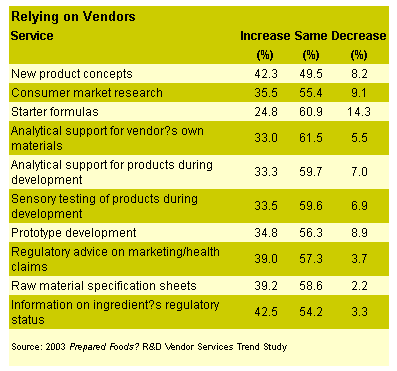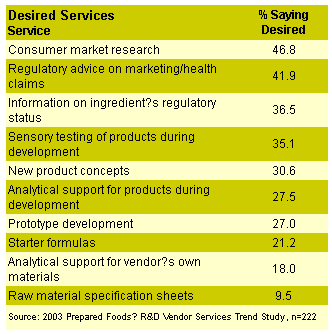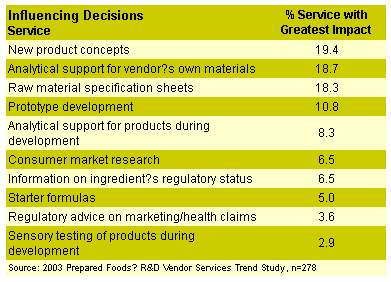
The survey, which polled producers across the U.S. and Canada, was directed to those within a company most responsible for new product development and ingredient purchasing. The companies produce everything from appetizers and snacks to processed meats to nutritional products. Three-quarters of the respondents specifically are involved with Research and Development, with the balance evenly split between Purchasing and General Management; their responsibilities are heavily weighted toward formulation and new product development and the ability to influence ingredient specifications.
Participants were given a list of ten services typically offered by ingredient vendors and asked to rate their availability, desirability, and influence on purchasing decision-making. The services include: new product concepts, consumer market research, starter formulas, analytical support for vendor's own materials, analytical support for products during development, sensory testing of products during development, prototype development, regulatory advice on marketing/health claims, raw material specification sheets, and information on ingredient's regulatory status. The participants also were asked a series of questions regarding their companies' decision-making processes and their involvement in that process.

More is More
In general, the respondents indicate they are relatively satisfied with the service level they currently receive from their vendors, but would like to see more services provided. Reliance on all services has significantly increased over the past three years. The participants indicated the availability of these services had a high level of influence on their decision-making, with 44.6% attributing a “great deal of influence” to the services, and 47% acknowledging that available services at least somewhat influenced the decision-making process.The most common service supplied was raw material specification sheets (87.6%), and respondents also reported that these specification sheets were one of the top three most important factors in choosing a vendor. The importance of specifications likely goes beyond simple documentation to reflect on the overall quality of an ingredient. Analytical support of the vendor's materials was also one of the top three factors, with 69.5% of those surveyed receiving this service from ingredient vendors with which they have an ongoing relationship.
The most important factor influencing choice of an ingredient vendor was cited as “new product concepts.” Some 58.7% of the respondents already receive assistance with new products; over half declare themselves satisfied with the level of service they receive, and a third are somewhat satisfied. Of those that do not receive this assistance, 30.6% would like to see their ingredient vendor offer it.
Related services, prototype development and analytical support of products during development ranked high in services currently received and as a service customers would like to see offered; however, they were less likely to affect a customer's decision in choosing an ingredient vendor. Participants showed a significant increase in reliance on all three of these factors over the last three years, with 42.3% increasing their need for new product concepts, 33.3% desiring additional analytical support in the development stages, and 34.8% expanding prototype development.
Aside from new product concepts, the vendor service that manufacturers report the most increased need for is information on the ingredient's regulatory status. Paralleling a higher demand for regulatory advice on marketing/health claims and for raw material specification sheets, this may partly reflect the tightening of governmental and consumer standards for food and nutritional products as well as regulations that are more complex. With a highly educated consumer, clean labeling is an important part of marketing, and food manufacturers are looking to the ingredient producer to provide them with the information they need to make accurate, defensible statements on the goods they provide.

The connection of vendor to service is especially strong in the question regarding services that are not offered, but which the participants would like to see provided. Some 46.8% of the respondents indicated they would like vendors to supply consumer market research, a service traditionally provided by outside sources. Here, too, the need for help in navigating government regulations is expressed, with regulatory advice on marketing/health claims requested by 41.9% of participants, and information on ingredients' regulatory status by 36.5%.

Not Sharing Alike
Although food manufacturers expect their ingredient vendors to provide a significant number of services, there are perceived risks. Where free vendor services are offered, 53.6% of the survey participants expressed concerns about the vendor inadvertently sharing knowledge gained with competitors, while 27.4% expected that the consistency of the service would be affected. Proprietary information was to be shared by 57.4% of the respondents only with a formal, detailed contract; only 20.6% would share proprietary information with vendors with which they have close, informal connections. 10.8% would not share proprietary data under any circumstances. And—despite the increase in e-research—only 4.4% of the companies surveyed share a common product development database with any vendor.
Even so, the trend seems clear. Today's food manufacturers expect more proactive participation in product development and marketing from their ingredient vendors. Vendors no longer are simply suppliers of raw material; increasingly, they are contributors in development, partners in production and sources of information. Manufacturers rely heavily on the expertise of the ingredient producer to guide them through the process of producing the high quality food today's consumer demands.
Sidebar: Survey Methods
The 2003Prepared FoodsR&D Vendor Services Trend Study examines trends in the use of various services received byPrepared Foodsreaders.A group of 1,500 participants, randomly chosen from the pool of individuals actively involved in the ingredient-purchasing decisions of their companies, were sent a copy of the survey.
The participants were chosen from Prepared Foods' circulation base and sent to those with the following functions: 70% R&D, 15% General Management, and 15% Purchasing. Respondents were skewed slightly toward R&D with 75% having that function. The survey was confidential and individual responses were not identified.
The survey produced 423 useable returns for a 29% response rate, excellent when compared to the usual 18 to 20% rate.
This is an overview of the 2003 Prepared Foods R&D Vendor Services Trend Study. The report can be obtained for $295. For more information, write to R&D Vendor Service Trend Study, c/o Claudia O'Donnell, Prepared Foods, 1050 Illinois Route 83, Suite 200, Bensenville, IL, 60106-1096. Or, e-mail pfeditors@bnp.com and put “R&D Vendor Service Trend Study” in the subject line.